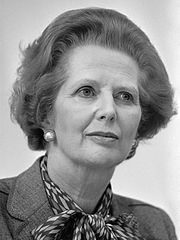
Back كيث جوزيف Arabic كيث چوزيف ARZ Keith Joseph German Keith Joseph French Keith Joseph KW Keith Joseph Dutch Keith Joseph Polish Джозеф, Кейт Russian Keith Joseph Turkish Кіт Джозеф Ukrainian
The Lord Joseph | |||||||||||||||||
|---|---|---|---|---|---|---|---|---|---|---|---|---|---|---|---|---|---|
 Joseph in 1964 | |||||||||||||||||
| Secretary of State for Education and Science | |||||||||||||||||
| In office 11 September 1981 – 21 May 1986 | |||||||||||||||||
| Prime Minister | Margaret Thatcher | ||||||||||||||||
| Preceded by | Mark Carlisle | ||||||||||||||||
| Succeeded by | Kenneth Baker | ||||||||||||||||
| Secretary of State for Industry | |||||||||||||||||
| In office 4 May 1979 – 11 September 1981 | |||||||||||||||||
| Prime Minister | Margaret Thatcher | ||||||||||||||||
| Preceded by | Eric Varley | ||||||||||||||||
| Succeeded by | Patrick Jenkin | ||||||||||||||||
| Secretary of State for Social Services | |||||||||||||||||
| In office 20 June 1970 – 4 March 1974 | |||||||||||||||||
| Prime Minister | Edward Heath | ||||||||||||||||
| Preceded by | Richard Crossman | ||||||||||||||||
| Succeeded by | Barbara Castle | ||||||||||||||||
| |||||||||||||||||
| |||||||||||||||||
| |||||||||||||||||
| Personal details | |||||||||||||||||
| Born | Keith Sinjohn Joseph[1] 17 January 1918 London, England | ||||||||||||||||
| Died | 10 December 1994 (aged 76) London, England | ||||||||||||||||
| Political party | Conservative | ||||||||||||||||
| Spouses | Hellen Guggenheimer
(m. 1951; div. 1985)Yolanda Castro Sheriff
(m. 1990) | ||||||||||||||||
| Parent |
| ||||||||||||||||
| Alma mater | Magdalen College, Oxford | ||||||||||||||||
| Military service | |||||||||||||||||
| Allegiance | |||||||||||||||||
| Branch/service | |||||||||||||||||
| Rank | Captain | ||||||||||||||||
| Unit | Royal Artillery | ||||||||||||||||
| Battles/wars | World War II | ||||||||||||||||
| Part of the politics series on |
| Thatcherism |
|---|
 |
| This article is part of a series on |
| Conservatism in the United Kingdom |
|---|
 |
| Part of a series on |
| Christian democracy |
|---|
 |
|
|
Keith Sinjohn Joseph, Baron Joseph, Bt, CH, PC (17 January 1918 – 10 December 1994), known as Sir Keith Joseph, 2nd Baronet, for most of his political life, was a British politician. A member of the Conservative Party, he served as a minister under four prime ministers: Harold Macmillan, Alec Douglas-Home, Edward Heath, and Margaret Thatcher. He was a key influence in the creation of what came to be known as Thatcherism.[2]
Joseph introduced the concept of the social market economy into Britain, an economic and social system inspired by Christian democracy.[3] He also co-founded the Centre for Policy Studies writing its first publication: Why Britain needs a Social Market Economy.[4]
- ^ "OBITUARY: Lord Joseph". The Independent. London: INM. 12 December 1994. ISSN 0951-9467. OCLC 185201487. Retrieved 22 July 2014.
- ^ "Keith Joseph, the father of Thatcherism, 'was autistic' claims". The Independent. 12 July 2006.
- ^ Birnie, Esmond. "Christianity and the Social Market Economy in Britain, Germany and Northern Ireland" (PDF). biblicalstudies.org.uk. Retrieved 21 October 2019.
- ^ Turner, Rachel S. (2008). Neo-liberal Ideology: History, Concepts and Policies. ISBN 9780748632688. Retrieved 30 July 2017.